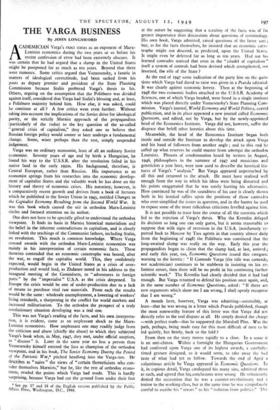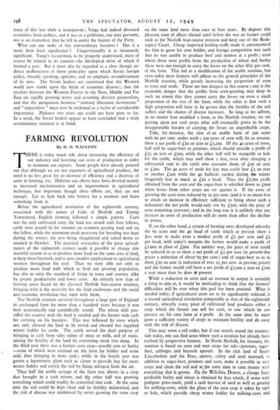THE VARGA BUSINESS
By JOHN LONGSWORD
ACADEMICIAN Varga's exact status as an exponent of Marx- Leninist economics during the two years or so before his recent confession of error had been extremely obscure. It was certain that he had argued that a slump in the United States might be postponed for as much as ten years. Beyond that there were rumours. Some critics argued that Voznesensky, a fanatic in matters of ideological correctitude, had been sacked from his posts as deputy premier and president of the State Planning Commission because Stalin preferred Varga's thesis to his. Others, arguing on the assumption that the Politburo was divided against itself, considered that Varga had Stalin's blessing and, at least, a Politburo majority behind him. How else, it was asked, could he continue at all ? A few critics went even further. Without taking into account the implications of the Soviet drive for ideological purity, or the strictly Marxist approach of the propagandists (particularly of the radio) to the key question of the so-called "general crisis of capitalism," they asked one to believe that Russian foreign policy would sooner or later undergo a fundamental change. Some, wiser perhaps than the rest, simply suspended judgement.
Varga was no ordinary economist, least of all an ordinary Soviet economist. Seventy years of age and by birth a Hungarian, he found his way to the U.S.S.R. after the revolution failed in his native land in the early 1920s. His background, therefore, is Central European, rather than Russian. His importance as an economist springs from his researches into the .economic develop- ment of capitalist States and the valuable work be has done on the . history and theory of economic crises. His notoriety, however, is a comparatively recent growth and derives from a book of lectures which he published in the Soviet Union in 1945, entitled Changes in the Cwitalist Economy Resulting from the Second World War. It was this book which caused the stir in orthodox Marx-Leninist circles and focused attention on its author.
One does not have to be specially gifted to understand the orthodox
viewpoint. It finds its basis in Marxist historical materialism and the belief in the inherent contradictions in capitalism, and is closely linked with the teachings of the Communist fathers, including Stalin, on revolution. This much is common knowledge. Where Varga crossed swords with the orthodox Marx-Leninist economists was mainly in his interpretation of certain economic facts. These theorists contended that an economic catastrophe was bound, after the war, to engulf the capitalist world. This, they confidently expected, would begin in the United States as a crisis of over- production and would lead, as Zhdanov noted in his address to the inaugural meeting of the Cominform, to "adventures in foreign parts" by the " imperialist " U.S.A. as the crisis deepened. In Europe the crisis would be one of under-production due to a lack of means to purchase vital raw materials. From each the results would be the same: wholesale unemployment, a lowering of workers' living standards, a sharpening in the conflict for world markets and increased militarisation. To the orthodox the prospect of a truly revolutionary situation developing was a real one.
This was not Varga's reading of the facts, and his own interpreta-
tion, it is evident, came as an unpleasant shock to the Marx- Leninist economists. How unpleasant one may readily judge from the criticism and abuse (chiefly the abuse) to which they subjected Varga's book when, in May, 1947, they met, under official auspices, to " discuss " it. Later in the same year no less a person than Voznesensky himself entered the lists as champion of the orthodox viewpoint, and in his book, The Soviet Economy During the Period of the Patriotic War,* pitched headlong into the Varga-ites. He describes as " naive " the views of "certain theoreticians who con- sider themselves Marxists," but he, like the rest of orthodox econo- mists, evaded the points which Varga had made. This is hardly surprising, because Varga had cut the ground from under their feet *See pp. 17 and 18 of the English version published by the Public Affairs Press, Washington, D.C., 1948.
at the outset by suggesting that a scrutiny of the facts was of fir greater importance than discussions about questions of terminology. His own book, Varga admitted, raised questions of the latter sort ; but, as for the facts themselves, he insisted that an economic catas- trophe might not descend, as predicted, upon the United States. It might even be deferred for as long as ten years. Had not his learned comrades noticed that even in the "citadel of capitalism" itself a system of controls had been devised which strengthened, not lessened, the role of the State ?
At the end of 1947 some indication of the party line on the ques- tions which Varga had dared to raise was given in a Pravda editorial. It was clearly against economic heresy. Then at the beginning of 1948. the two economic bodies attached to the U.S.S.R. Academy of Sciences, one of which Varga headed, were fused in a single institute which was placed directly under Voznescnsky's State Planning Com- mission. Varga's journal, World Economy and World Politics, ceased publication, and in its place appeared a new journal called Economic Questions, and edited, not by Varga, but by the newly-appointed head of the Economics Institute. Varga did not, however, suffer the disgrace that befell other heretics about this time.
Meanwhile, the head of the Economics Institute began both inside and outside the Institute to develop the attack upon Varga and his band of followers from another angle ; and to this end h.: called up what reserves he could muster from arttongst the orthodox Leninists. Phrases of condemnation heard by writers in August, 1946, philosophers in the summer of 1947 and musicians and geneticists a year later, were now used to describe the heretical fea- tures of Varga's "analysis." But Varga appeared unperturbed by all this and returned to the attack. He must have realised well enough from the way in which his ideas were being distorted and his points exaggerated that he was sorely hurting his adversaries. How convinced he was of the soundness of his case is clearly shown both in his ironical sallies upon the positions of those comrades who over-simplified the issues in question, and in the banter he used to expose some of the more ridiculous criticisms levelled against him.
It is not possible to trace here the course of all the currents which led to the rejection of Varga's thesis. Why the Kremlin delayed its decision so long one can only guess, but it seems reasonable to suppose that with signs of recession in the U.S.A. (assiduously re- ported back to Moscow by Tass agents in that country almost daily from the beginning of 1948) the Politburo was convinced that the long-awaited slump was really on the way. Early this year the propagandists began to claim that the slump had, at last, arrived ; and early this year, too, Economic Questions issued this categoric warning to the heretic: "If Comrade Varga (the title was comrade, not academician) continues to be stubborn in insisting on his rc-. formist errors, then there will be no profit in his continuing further scientific work." The Kremlin had clearly decided that it had had enough. But Varga returned to defend his position once again, and, in the same number of Economic Questions, asked : "If there are new arguments which show me I am wrong, I shall openly recognise that I am wrong."
A month later, however, Varga was admitting—ostensibly, at least—that he was wrong in a letter which Pravda published, though the most noteworthy feature of this letter was that Varga did not directly refer to the real dispute at all. He simply denied the charge —with perfect truth—that he supported the Marshall Plan... Was the path, perhaps, being made easy for this most difficult of men to be led quietly, but firmly, back to the fold ?
From then on the story moves rapidly to a close. In a sense it is an anti-climax. Within a fortnight the Hungarian Government had conferred upon Varga one of its highest awards, a carefully- timed gesture designed, so it would seem, to take away the had taste of what had yet to follow. Towards the end of April a voluminous article by Varga appeared in Economic Questions. In it, in copious detail, Varga catalogued his many sins, admitted them as such, and agreed that hisbconclusions were wrong He vehemently denied the accusation that he was a counter-revolutionary and a traitor to the working-class, but at the same time he was scrupulously careful to ascribe his " errors " to his "isolation from politics." The
irony of this last shaft is transparent ; Varga had indeed divorced economics from politics, and it was as a politician, one may presume, not as an economist, that he fell in under the banner of the Party.
What can one make of this extraordinary business ? Has it a more than local significance? Unquestionably it is immensely significant. Varga's recantation, to be properly understood, must of course be related to its context—the ideological drive of which it formed a part. But it must also be regarded as a clear though in- direct reaffirmation of those principles upon which Soviet foreign policy, broadly speaking, operates, and an emphatic re-endorsement of its aims. The Soviet leaders are convinced that the Western world now stands upon the brink of economic disaster ; that the rivalries between the Western Powers in the Near, Middle and Far East are rapidly growing worse and assuming decisive proportions, and that the antagonism between "national liberation movements" and "imperialists" must now be reckoned as a factor of considerable importance. Zhdanov two years ago could not have gone so far. In a word, the Soviet leaders appear to have concluded that a truly revolutionary situation is at hand.































 Previous page
Previous page